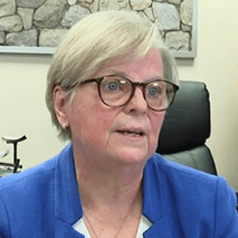Meet Barbara Pierce

Barbara Pierce, Ph.D., LCSW, has been a clinical social worker for 40 years and an academic for 20 years. She is a Professor of Social Work at the IU School of Social Work and a Robert Wood Johnson Clinical Scholars Fellowship Program graduate. Her focus has always been on bringing trauma-responsive and equitable health programming to educating students and practitioners. Her new grant, part of the bipartisan Safer Communities Act, is a Mental Health Service Professional Demonstration Project to build capacity for school mental health services in Indiana. This $5.7 million 5-year grant will serve low-income school corporations in communities with low mental health service capacity.
In her free time, Dr. Pierce enjoys spending time with her family and church. Dr. Pierce and her husband also enjoy listening to classical music and watching foreign detective television show on PBS, Acorn, Britbox, and sometimes Netflix. Lastly, they love travelling to the United Kingdom in Europe.

I love working with communities of practice (the Department of Child Services, schools, etc.) to help them solve problems in their systems that have trauma and social determinants at their core.
Dr. Barbara Pierce
Q and A with Dr. Barbara Pierce
I have always worked with persons who have been victims of some sort of trauma, including child abuse and interpersonal violence. Bringing my practice experience into my research seemed natural and gave me a way to make changes in systems where I saw gaps.
I try to bring knowledge of the science of trauma and social determinants of health into the practice world to help practitioners use the underlying science of how trauma and poverty affect those in their care in their everyday work.
Through multiple projects and working with various teams, we have been able to bring trauma responsive programming and understanding of the social determinants of health to neighborhood community centers, the Department of Child Services (DCS), and schools. This work has also impacted the curriculum at IUPUI.
I love working with communities of practice (the Department of Child Services, schools, etc.) to help them solve problems in their systems that have trauma and social determinants at their core. So, at DCS, for example, practitioners working with highly traumatized children, many of whom live in poverty and unsafe neighborhoods, also get secondary stress and even trauma as practitioners. Helping them understand the science of trauma and the impact of working with children who live in poverty and unsafe situations by teaching them ways to think differently, from what is wrong with a child to what happened to them, is so rewarding for me.
It also helps me explain to practitioners why they are feeling so stressed and burned out and want to leave their jobs. The same thing happens with school personnel when they know that the children they are teaching go home to stress, trauma, guns, poverty, and family upset. These children, in turn, bring stress and trauma behaviors to school every day, and schools must cope with children’s emotions and behaviors. Rather than punishing children, we help school personnel understand what is underlying the behavior and put social workers in place in schools to work through the trauma, fill social service needs for food and community services, and teach new skills for building resilience.
My research always involves graduate students who serve as data collectors, project managers, site coordinators, etc. Mentoring graduate students is crucial since we are building the next generation of practitioners, scholars, and researchers.
Community members are integrally engaged in my work. Sometimes, they are consumers, but mostly, I work within professional communities to help them build their own capacity to work with consumers who are mostly children and families.
Our research team was just awarded $5.7 million to increase the capacity of providing mental health services in schools in Indiana because Indiana is one of many mental health deserts in the United States. This involves recruiting and funding MSW students to learn school mental health practices and become licensed practitioners working with children in school settings.
The other goal of this project is to increase the knowledge and skills of those practitioners who are already working in school settings to help children with their mental health through prevention, assessment, and intervention when necessary. By the end of our work we hope to have funded 125 new MSWs for Indiana and to serve the over 30,000 children in the school districts with whom we are workings. To date, our 11 students this year have served over 3,500 school children since August 2023.
Conversation with Dr. Barbara Pierce
On Friday, January 26, 2024, from 12 noon to 1:00 p.m., Dr. Barbara Pierce talked about “From Clinician to Community-Engaged Translational Practitioner: Building Social and Mental Health Programs for Children, Families, and Practitioners.”
Lack of mental health professionals and economic and geographic barriers to care are common in the United States. Overcoming these barriers means providing affordable services in places where there are children. This conversation focuses on work centered on a new grant to increase the ability of school districts to provide preventive and interventive mental health services by educating trauma-responsive social work students and practitioners who can recognize social inequality and help connect children and families to services and care. Hear from Dr. Pierce, her community partners and students about how they are working to support the mental health of children and adults.
Interested in Becoming an IUPUI TRIP Scholar?
Eligibility
IUPUI faculty member conducting translational community-based research
Benefits
- Valued member of an extensive network of researchers/collaborators
- Opportunities to showcase work
Subscribe to the TRIP Scholars of the Month

